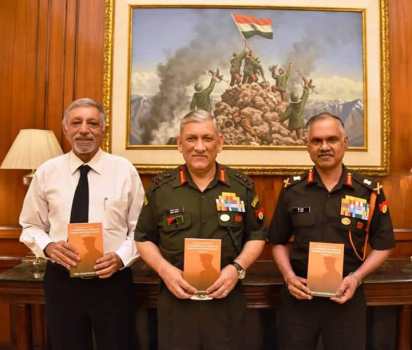
A fearless professional The Excelsior 11 Dec 2021
A fearless professional The Excelsior 11 Dec 2021
A soldier’s soldier who speaks from his heart, sharing his opinion without concern of repercussions or criticism. He speaks when he is convinced and refuses to withdraw his comments despite pressures. He has time for everyone and never considers himself a cut above, notwithstanding having occupied the top spot in the military hierarchy. This is General Bipin Rawat who as the nation’s first Chief of Defence Staff (CDS) was pushing the creation of theatre commands against opposition from different quarters. He was given a role and a task and General Rawat understood it was his responsibility to fulfil it.
Having served in every theatre in India, Bipin was more than qualified for the top post. He commanded his battalion along the LAC, brigade in J and K in counter insurgency operations and division along the LoC. He was the corps commander who launched the first cross border strike in Myanmar on 2015. It changed the context of Indian response to terrorist strikes and sent a message across the globe. Pakistan failed to take the hint and was the next to suffer. The lessons from this strike were implemented when India launched the first strike on Pak soil in 2016. Bipin had no hesitation in admitting his limitations. He had stated that his knowledge of operations of the navy and air force were enhanced as a CDS, and he hoped future generations would learn much faster.
Bipin knowledge of Chinese tactics, philosophy and methodology of operations had been built over time. He was aware that Chinese understood force and pressure, if resolutely applied. This is what he implemented in Doklam, where the Chinese were stopped in their tracks. He was certain that with passage of time they would pull back and it did happen. He stuck to the terms of Indo-China agreements thereby giving them little chance to protest.
Many decisions taken by him, including curtailing hotel accommodation, reduction of pension bills and limiting CSD procurements were criticized. However, these were not aimed at anyone’s benefit but to reduce wasteful expenditure and provide a level playing field to all. Some initially did feel that he was against his own brethren but over a period of time they understood. For Bipin, it was done to benefit the service and hence acceptable despite all criticism.
Indigenization and encouraging home industry increased during his watch. In the Lucknow defence expo, General Rawat devoted maximum time in Indian start-ups, enquiring, collecting details and advising them on how to move forward. He believed that the future lies in Atmanirbhar Bharat and dependency on imports must reduce in case we are to become a global military power. The regular release of negative list of imports added confidence within the domestic defence industry. His last visit was to Nagpur to support domestic manufacturing.
There are very few military leaders who have spoken with such conviction on a public platform as General Rawat has done, whether it be China, Pakistan, internal scenarios or even the China-Islamic network. China had protested when he termed them as India’s primary adversary. He stuck to his guns and refused to back down. In a subsequent seminar, addressing members of BIMSTEC (Bay of Bengal Initiative for Multi-Sectoral Technical and Economic Cooperation) while referring to COVID 19, he warned that nations must be prepared for biological warfare. Evidently, he was again hitting at the Chinese.
In his role as the CDS pushing theatre commands, Bipin was doing what he believed in, integrating Indian armed forces into one cohesive fighting force. There was intense opposition from within as also from strategic analysts outside, as after all he was changing what had been considered acceptable for over seven decades. He believed that this was the future, and he went about convincing those who were opposing. He has created the base and shortly the nation would witness rolling out of theatre commands.
He also played a major role in military diplomacy. His recent visits to Russia and the US left a mark on those nations. Senior diplomatic and military members of these countries conveyed their grief at his untimely demise. Condolences pouring from every corner of the globe displayed the global reputation that he had created not only for himself but for the Indian armed forces.
Within India, General Rawat has always spoken his mind, ignoring criticism coming his way. Many of his statements have been adversely commented upon by some political parties. His comments on agitations drew angry response from few politicians, terming it as the army venturing into politics. Bipin had neither mentioned any ongoing agitation nor a political party. He considered he was sharing his views as an Indian, which is his constitutional right. Hence, he refused to withdraw these remarks despite political criticism.
Honouring Major Leetul Gogoi, who controlled a mob by tying a stone thrower to his jeep brought him into another controversy. An army spokesperson commented, ‘The award was given for his good work in CI operations in the Valley, including this incident.’ It brought forth a barrage of criticism, but General Rawat stuck to his guns. More recently his statement that J and K could face fresh restrictions brought anger amongst its politicians. Bipin spoke what he felt was right and that is rare from a military man.
Bipin lifted the reputation and prestige of the Indian armed forces not only within the country but also globally. He bonded well with people from all parts of the country. The love and affection shown by the masses, many of whom never saw or knew him displays affection for a national icon. He leaves behind a legacy which few would match. He has set the ball rolling for changing the armed forces into one for the future. It is hoped that this will be carried forward by whoever takes his place. The nation and the armed forces would miss this fearless and outspoken visionary.